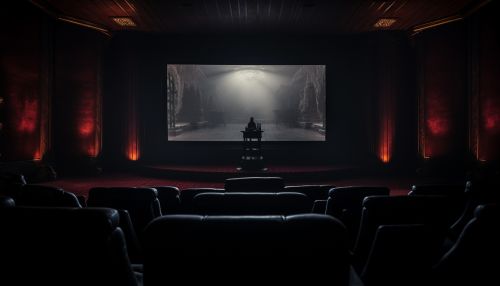Cognitive Psychology in Film
Introduction
Cognitive psychology is a branch of psychology that studies mental processes including how people think, perceive, remember, and learn. As part of the larger field of cognitive science, this branch of psychology is related to other disciplines including neuroscience, philosophy, and linguistics. The application of cognitive psychology to the understanding of film involves the study of how these mental processes are engaged and manipulated by filmmakers to create specific effects and responses.


Cognitive Processes in Film Viewing
The viewing of a film is a complex cognitive process that involves a range of mental activities. These include perception, attention, memory, and emotion. Each of these processes plays a significant role in how we understand and interpret films.
Perception
Perception is the process by which we interpret sensory information to understand our environment. In film, perception is engaged in a variety of ways. For example, the use of color, lighting, and camera angles can significantly influence our perception of a scene or character. Filmmakers often manipulate these elements to guide viewers' perceptions and interpretations.
Attention
Attention is the cognitive process that allows us to focus on specific aspects of our environment while ignoring others. Filmmakers often use techniques such as close-ups, sound effects, and music to direct viewers' attention to specific elements or details within a film.
Memory
Memory plays a crucial role in film viewing. Our ability to remember previous scenes, characters, and plot details influences our understanding and interpretation of a film. Filmmakers often use techniques such as flashbacks and foreshadowing to engage viewers' memory and guide their understanding of the narrative.
Emotion
Emotion is a complex cognitive process that is closely tied to our perceptions, attention, and memory. Filmmakers often use techniques such as music, lighting, and camera angles to evoke specific emotions in viewers. These emotional responses can significantly influence our interpretation and enjoyment of a film.


Cognitive Psychology and Film Theory
Cognitive psychology has been applied to the study of film in a variety of ways. This includes the development of cognitive film theory, which seeks to understand film from a cognitive perspective.
Cognitive Film Theory
Cognitive film theory is a branch of film theory that applies the principles and methods of cognitive psychology to the study of film. This approach seeks to understand how viewers' mental processes influence their understanding and interpretation of films. Cognitive film theorists often focus on how filmmakers use specific techniques to engage and manipulate these mental processes.
Narrative Comprehension and Interpretation
One of the key areas of focus in cognitive film theory is narrative comprehension and interpretation. This involves the study of how viewers understand and interpret the narrative structure of films. Cognitive film theorists often use concepts and theories from cognitive psychology, such as schema theory and mental models, to explain these processes.
Viewer Engagement and Response
Another key area of focus in cognitive film theory is viewer engagement and response. This involves the study of how viewers engage with films and how they respond to specific elements and techniques. Cognitive film theorists often use concepts and theories from cognitive psychology, such as attention, perception, and emotion, to explain these processes.


Conclusion
The application of cognitive psychology to the study of film provides a valuable framework for understanding how viewers engage with and interpret films. By examining the cognitive processes involved in film viewing, we can gain a deeper understanding of how filmmakers use specific techniques to create specific effects and responses. This approach also provides a valuable bridge between the fields of psychology and film studies, opening up new avenues for research and exploration.
